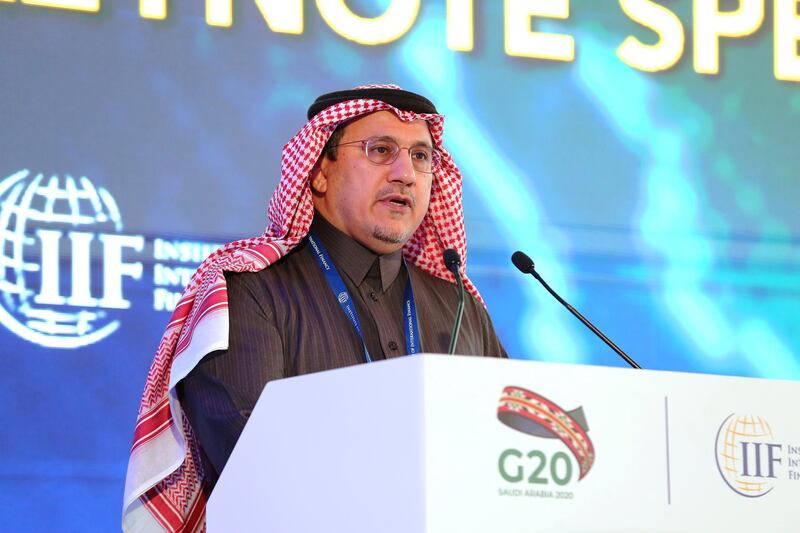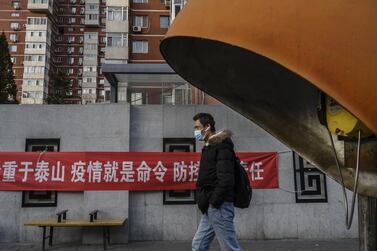Saudi Arabia’s economy is expected to accelerate at a faster pace this year than 2019, driven by a bouyant private sector, its central bank governor said.
“We have a positive view on the Saudi economy,” Ahmed Al Kholifey told reporters in Riyadh where G20 finance ministers and central bank governors are meeting. “The forecasts are positive and the growth will be higher than last year …. especially from the private sector,” he said.
Banks in the kingdom have seen mortgage financing grow and lending to individuals and small and medium-sized businesses increase, he added.
Saudi Arabia, Opec’s top oil producer, is radically transforming its economy to cut dependence on oil revenues under its overarching Vision 2030. The programme aims to curb subsidies and government spending to generate alternative revenue lines. Development of the private sector economy and an expansion of the country’s non-oil industrial base are at the heart of the Riyadh’s diversification efforts.
Saudi Arabia's economy, the largest in the Arab world, is recovering from a three-year oil price slump. The International Monetary Fund in January said it expects the kingdom’s economy to expand by 1.9 per cent in 2020, up from an estimated 0.4 per cent last year. The Washington-based fund, however, lowered its earlier 2.2 per cent economic expansion forecast due to oil production cuts agreed by Opec+ group of oil producing countries, led by Saudi Arabia and Russia.
“What I can say in a nutshell is that GDP growth in Saudi Arabia is projected to see an upgrade this year,” Mr Al Kholifey earlier told the delegates at the Institute of International Finance conference in Saudi capital. “This [is] positive development,” he said.
The kingdom’s monetary, structural and fiscal policies are “all geared towards the expansion of private non-oil sector over the mid-term,” he said, adding the key policy goal is to achieve economic diversification while maintaining stable monetary and financial conditions in the country.
“This is a positive message not only for Saudi Arabian citizens but also for the region [and its economy],” he added.
Jean Lemierre, chairman of the board of director at BNP Paribas, agreed with Mr Al Kholifey.
“At a time when Saudi Arabia has a clear vision of 2030, [a] clear view about what to do, I hope the private sector gets involved more and more in this country,” he told the conference delegates.
The banks have a role to play in the development of the kingdom’s economy, by committing to supporting corporate sector and helping in jobs creation- a key pillar of the country’s economic agenda.
Saudi Arabia, which has the G20 rotating presidency this year, is hosting the two-day meeting of G20 finance ministers and the central bankers amid calls for a unified action to tackle economic risks facing the global economic growth such as the coronavirus outbreak. The spread of infection, according to some estimates, may cost the global economy $1 trillion in losses. This is more than double the economic impact that an outbreak of a severe acute respiratory syndrome (SARS)-which cost the economy $45bn-in 2002.
Covid-19, as the virus is named, has so far infected 75,500 cases in mainland China with more than 2,200 deaths. Outside China more than 1,150 cases of the virus have been confirmed in 26 countries and there have been at least eight deaths as a result of the infection.
The spread of infection has brought the Chinese economy to a grinding halt and has disrupted global supply chain. Deutsche Bank estimates the epidemic can shave of 0.3 percentage points from the global economic growth this year while the IMF too said it could impact global growth.
“In our current baseline scenario, announced policies are implemented and China’s economy would return to normal in the second quarter. As a result, the impact on the world economy would be relatively minor and short-lived," said Kristalina Georgieva, Managing Director of the International Monetary Fund in a statement.
“In this scenario, 2020 growth for China would be 5.6 percent. This is 0.4 percentage points lower than the January WEO Update. Global growth would be about 0.1 percentage points lower."
However, Mr Al Kholifey said it is too early to say what is the real impact of the spread of the virus on the global growth.
“At our G20 meeting, we are looking for good news [on economic front] from other countries as well. Which will hopefully confirm the base line projection that growth slowdown has bottomed out,” he said.
The world, he said, should not disregard the fact that the there are other risks still confronting growth prospects including an escalation in trade tensions.








